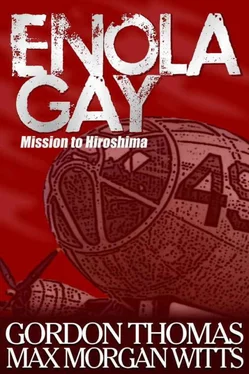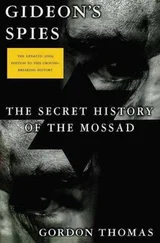Yet this evening the war seemed as remote as ever to Yokoyama. The city below him was peaceful, a vast cluster of black-tiled roofs encased in a natural bowl of reclaimed delta surrounded by green hills and peaks.
But in Yokoyama’s opinion Hiroshima was highly vulnerable to air attack. All a bomber need do was drop its load within the bowl to be almost certain of causing damage. Apart from a single kidney-shaped hill in the eastern sector of the city, about half a mile long and two hundred feet high, Hiroshima was uniformly exposed to the spreading energy that big bombs generate.
Structurally—like San Francisco in the earthquake and fire of 1906—Hiroshima was built to burn. Ninety percent of its houses were made of wood. Large groups of dwellings were clustered together. And, unlike San Francisco in 1906, Hiroshima in 1944 had antiquated firefighting equipment and poorly trained personnel.
From where he stood, Yokoyama could clearly see the city boundaries. Only thirteen of Hiroshima’s twenty-seven square miles were built up, and only seven of these densely, but in that area some thirty-five thousand people were crammed into every square mile. His battery on Mount Futaba was there to protect them.
He saw that the gun crews were ready. Another practice began. Yokoyama watched them. The men were stripped to the waist, sweating in the warm evening air. Load, aim, unload. A new traverse. Load, aim, unload. A swift, stylistic ritual of crisp commands and grunts.
He was pleased with them now, the way they responded promptly to his orders. They were the same commands he had given them for every drill since the battery was commissioned as part of the Hiroshima antiaircraft defense system in May 1943. Twenty-one guns of various calibers now defended the city. They had yet to be fired in anger in the third year of the war.
The practice over, the crews were about to relax when Yokoyama ordered the first punishment drill. As soon as that ended, he began the second one, watchful for any signs of slackness. That would earn the crews further punishment.
Satisfied, he relieved the gunners and led them to their quarters. There, as usual, he listened solicitously to their small talk. It was part of his duty to listen, just as he was expected to eat, drink, and sing with his men, to lend them money from his pocket, to invite them to visit his parents’ home in Tokyo. This was traditional behavior for a Japanese officer—the fostering of a comradely feeling, the encouraging of a relationship in which he was both father figure and close friend. It was what had helped to make the Imperial Japanese Army so formidable.
This evening his crews asked him a familiar question: when would they see action?
He understood their desire to fight. It was part of the samurai tradition, of the two-thousand-year history of Japan. The wish for battle was coupled with an absence of fear. Japan, more than any other nation, had excised fear from its warriors; death for them was part of living.
Yokoyama told his men to be patient. But he worried whether they would ever have the chance to shoot, to taste that special excitement. He wondered whether the story he had heard was true. A man who worked in local government had mentioned it to him. Yokoyama had at first dismissed it. But his friend had been so insistent, so specific, claiming “inside sources” for his information. Could there be any substance to the tale that many people in Hiroshima had relatives in San Francisco and Los Angeles who had petitioned Roosevelt to spare Hiroshima from attack and that he had agreed to do so as “a gesture of goodwill”?
Yokoyama knew that if this were true, then the enemy bombers would never come to Hiroshima, and all his practices would have been in vain.
Tibbets arrived at Wendover three days before the 393rd Heavy Bombardment Squadron. His prediction proved to be right. The officers and men hated Wendover, the bleaching heat, the inhospitable desert, the primitive accommodations, the dust, the rank drinking water, the termites, the rats and mice, the sheer remoteness of their position.
They hated not knowing why they were there.
On September 12, their second morning at the base, they awakened to find further cause for hatred. A formidable wire fence now penned them in. Inside its perimeter were warning signs. The largest, beside the base exit gate, read:
WHAT YOU HEAR HERE
WHAT YOU SEE HERE
WHEN YOU LEAVE HERE
LET IT STAY HERE
Sentries stopped anybody leaving.
Thickly coiled barbed wire barred the entrance to a number of hangars and workshops. Freshly painted notices announced that behind the wire lay the ordnance, armament, engineering, and radar shops. Each notice carried the legend:
RESTRICTED AREA
The wire was thickest around hangar No. 6. There, a notice announced:
TECH AREA “C”
MOST RESTRICTED
What was a Tech Area? Why “C”? Where were “A” and “B”? Nobody knew.
Those who tried to talk their way past the military policemen guarding the Tech Area were curtly told they faced arrest if they persisted.

The Western United States
A week ago, at the end of their training in Nebraska, the men of the 393rd had been proud that their squadron’s record was way above average. They had expected to go overseas soon. Some of the more enterprising had purchased quantities of silk stockings, soap, and perfumes to tempt the English and French girls they had heard so much about. One enlisted man had packed his record collection of jitterbug 78s, planning to sell them on London’s black market.
Instead, the 393rd had been shuffled off to Wendover.
There were no bombers at Wendover. Just a few rundown transport planes. Rumor said they had come to Wendover to pick up factory-fresh B-29s. But where were they? And why here?
Nobody knew.
The brief optimism withered. Other rumors rose, welled, and faded. Officers, like their men, had no idea of what was happening. Their commanding officer, Lieutenant Colonel Thomas Classen, had gone into the base headquarters on arrival and had hardly been seen since. And when he did appear, he deflected all questions.
By breakfast time, MPs were everywhere, their motorcycles and jeeps sending scuds of dust into the air. The 393rd had never tasted such sand. It permeated their clothes, skin, and food. The flavor to their cereals, eggs, and hash-browns this morning came from the great salt flats around the airfield.
After the meal, the squadron listened in stunned disbelief as their intelligence officer, Captain Joseph Buscher, tried to make light of their situation. He reminded them that he was a lawyer, used to pleading—and he said he was pleading with them now to “give the place a chance.”
Buscher admitted that he could not tell them why they were at Wendover, but he could tell them that the base was “only 125 miles from Salt Lake City, Utah. Elko in Nevada was “as close.” Buscher hoped they would find Wendover itself “fascinating.” The town, with a population of 103, was split down the middle by the Utah–Nevada state line. Half of Wendover ran their lives according to Utah’s Mormon Church. On the other side of town, there were bars, eateries, and slot machines.
“What about broads?”
The questioner was Captain Claude Eatherly, a tall, wickedly handsome pilot with a way with girls, cards, and a bottle of bourbon. With his small-boy grin, Texas drawl, and fund of jokes, Eatherly was the squadron playboy.
Читать дальше













